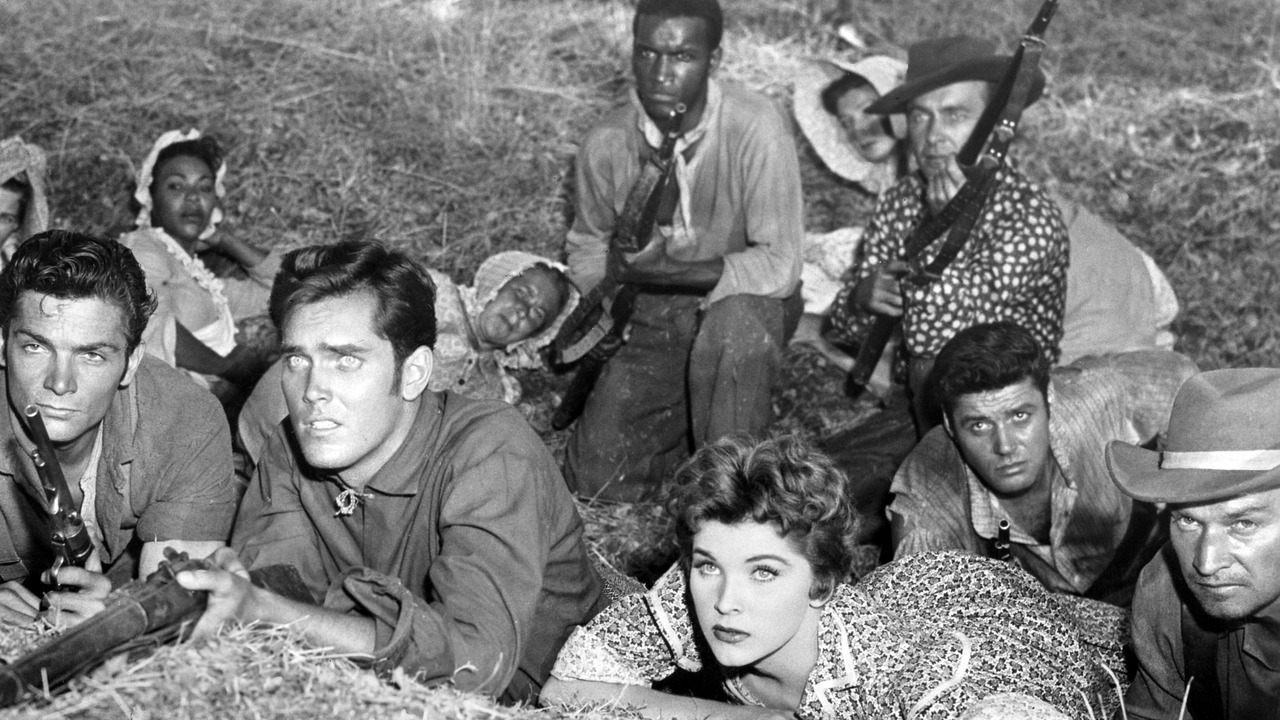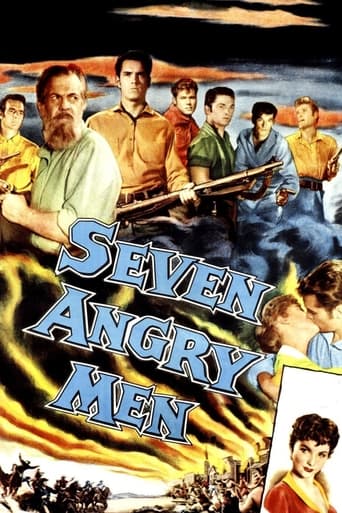Matcollis
This Movie Can Only Be Described With One Word.
Paynbob
It’s fine. It's literally the definition of a fine movie. You’ve seen it before, you know every beat and outcome before the characters even do. Only question is how much escapism you’re looking for.
Kinley
This movie feels like it was made purely to piss off people who want good shows
Fleur
Actress is magnificent and exudes a hypnotic screen presence in this affecting drama.
alexandre michel liberman (tmwest)
John Brown's story is certainly an interesting one and worth telling. Nobody can go against his main idea which was to free the slaves. The problem, as shown by this film was how his violence and fanaticism went against him. A lawyer at the end mentions that insanity runs in the family, but Brown makes a point of saying he is sane.The film explains his violence by showing it as a retaliation from the attack on Lawrence, Kansas. But you can say the conscience of the film is expressed by the character played by Debra Paget, who tries to hold her feelings in relation to Brown's son (Jeffrey Hunter) on account of Brown's violence. Was his desperate act at Harper's Ferry a catalyst for the civil war? The film shows it as an immediate failure, and leaves the question of its effect on the future on the air. For the story it tells this film is worth seeing, also for the story it does not tell.
wes-connors
"In 1856, five years before the beginning of the American Civil War, men fought and died in the Kansas Territory. Brave, violent men came from both sides of the Mason-Dixon Line and made 'Bleeding Kansas' a battleground. The prize was admission to the Union - as ether a free state or a slave state," reminds an opening scroll. Into the Kansas Territory rides bearded Raymond Massey (as John Brown) and his sons. A fierce abolitionist, Mr. Massey will go to any length to ensure Kansas obliterates slavery and enters the Union as a free state. Three years later, Massey may be at the end of his rope..."Seven Angry Men" refers to Massey's "John Brown" and his sons. There are, eventually, seven adult sons introduced. Yes, that equals eight. However, it's possible only seven are "angry" at any given time. Character development never moves the sons too far beyond looking like attractive young men who've answered an agent's casting call and tried on fake sideburns in the make-up room. The main son is handsome Jeffrey Hunter (as Owen). He receives some characterization by being the only one (oddly) to attract a steady woman. She is pretty Debra Paget (as Elizabeth Clark) from Illinois...Naturally, Ms. Paget is bothered by the family's frequently dangerous conflicts over slavery. It would have been interesting to see Paget arouse passion in some of the other sons. The next most featured son is handsome (okay, they're all handsome) Larry Pennell (as Oliver), impressive in his first screen appearance. Memorable last scenes momentarily bring Tom Irish (as Watson) and John Smith (as Frederick) to the forefront. Future TV favorites James Best (as Jason), Dennis Weaver (as John Jr.) and Guy Williams (as Salmon) are all fun to see, in early roles...Massey is fine as the biographical lead, although this mechanical story doesn't take full advantage of his impersonation. The film score, by then newcomer Carl Brandt, is noteworthy. The shadowy staging of several scenes, by director Charles Marquis Warren and photographer Ellsworth Fredericks, shows exemplary film technique.******* Seven Angry Men (3/27/55) Charles Marquis Warren ~ Raymond Massey, Jeffrey Hunter, Debra Paget, Larry Pennell
bkoganbing
Just as Raymond Massey set the Lincoln standard for essaying the role of our 16th president, he seems also to have set the standard for playing the fighting abolitionist John Brown. He did this first in Santa Fe Trail where Brown was a supporting character and again here in Seven Angry Men where Brown is the center of the story. While many of taken a run at Abe Lincoln very few have tried to do John Brown. The only other one coming to mind is Sterling Hayden. Seven Angry Men refers to John Brown and his six sons, three of whom die during the course of Brown's crusade against slavery first in Kansas and then in his raid on the Harper's Ferry Arsenal. His six sons are Tom Irish, Guy Williams, Jeffrey Hunter, Dennis Weaver, and Larry Pennell all of whom had significant careers be it before or after this film. As a subplot there is a romance going between Jeffrey Hunter and Debra Paget whose Northern sympathizing father is killed toward the beginning of the film.It will be a subject of debate among historians for years as to exactly what Brown's role was. He was a fanatic in a righteous cause, the abolition of slavery in the USA. The struggle over Kansas where Brown first appears was the opening gun of the Civil War. Four years earlier in 1850 the politicians in Washington, DC had thought they had put a damper on sectional feelings with the Compromise of 1850 which for the most part respected the line between slave and free states. But a guy named Stephen Douglas, Senator from Illinois had the brilliant idea of opening the question again to plebiscite. Our president at the time Franklin Pierce signed what was the Kansas-Nebraska Act which did just that. Settlers from the slave and free states poured in and a lot of shooting started. And that's where Brown, his sons, and his followers came in. Massey as Brown is so dominant in this film that very few others are given much of a chance. Black actors James Edwards and Joel Fluellen have some interesting roles, Edwards as a follower of Brown and Fluellen who is a free black who works as the Harper's Ferry telegrapher.The film was done by Allied Artists and it might have been better with a major studio. Major studios though weren't quite making films about such controversial subject matter in what was the beginning of the Civil Rights Era in America. Seven Angry Men is as good a film about a controversial man and his era as you will get.
theowinthrop
In 1940 Raymond Massey was at the peak of his film stardom. Born in Canada (the half-brother of Canadian Governor General Vincent Massey), he had established his stardom in England, and appeared in the film THINGS TO COME (1936). He appeared on Broadway in ETHAN FROME and ABE LINCOLN IN ILLINOIS, and the latter was made into a film in 1940 that garnered him an Oscar nomination. He also appeared in SANTA FE TRAIL as the abolitionist revolutionary John Brown. He brought a vividness and commitment to that part that made him (not Errol Flynn as Jeb Stuart) the center of attention. But the script, culminating in the attack on Harper's Ferry in October 1859, was wobbly - trying to placate southern audiences by suggesting the South would have solved the slavery issue without pressure from the North or the abolition movement. For most of the film Massey's Brown is a dangerous nut who is threatening the nation's peace - a fanatic that is striving to cause a slave revolt or war, and has killed several men. No attempt at balance is offered, or even any attempt at Brown's medical history (he had insanity in his family). Only in the last fifteen minutes is Massey's Brown redeemed when a worst type of villain (Van Heflin as a greedy instigator and traitor) betrays Brown's cause. We may not like violence, but Massey is supporting a view of life (anti-slave) that we approve of, whereas Heflin would betray anyone for money (he previously worked for Brown).SEVEN ANGRY MEN (1955) is Massey's second Brown film. Though it still has flaws in retelling Brown's story, it does attempt to show that the forces he faced in Kansas were as violent in a pro-slavery way as he was. We do get a chance to see a cleaned up version of the Ossawattomie Creek massacre, where Brown killed five men (actually cutting them to bits with a sword). And more details are gone into about Brown's planning and financing of the Harper's Ferry attack. Finally, the relations between Brown and his sons, and the sullen dislike of the latter for their father's views, is brought out. Although this is not the definitive Brown film (that still remains to be made) it is a great improvement over the waffling of SANTA FE TRAIL, with Massey still giving the role the right mixture of fanaticism and normality the part requires.

